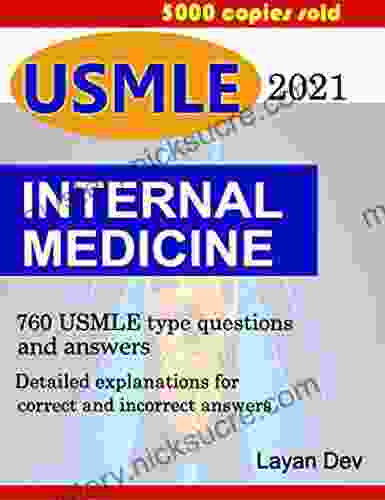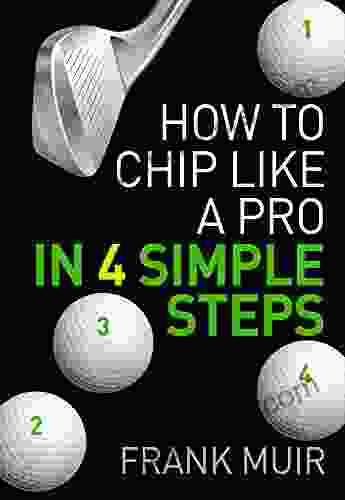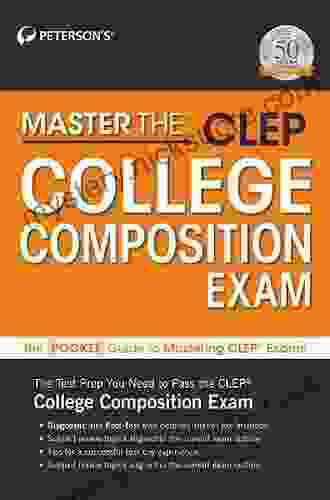Internal Medicine for USMLE: A Comprehensive Resource for Medical Students

Internal medicine is a broad field of medicine that encompasses the diagnosis and treatment of diseases affecting adults. It is a challenging and rewarding specialty, and the USMLE is one of the most important exams that medical students must pass in order to become licensed to practice medicine.
This article provides a comprehensive overview of internal medicine for the USMLE, including the core concepts, common diseases, and treatment options. With this knowledge, medical students can feel confident and prepared for the USMLE and their future careers as internal medicine physicians.
The core concepts of internal medicine include:
4 out of 5
| Language | : | English |
| File size | : | 742 KB |
| Text-to-Speech | : | Enabled |
| Screen Reader | : | Supported |
| Enhanced typesetting | : | Enabled |
| Print length | : | 507 pages |
| Lending | : | Enabled |
- Pathophysiology: The study of the mechanisms of disease.
- Pharmacology: The study of drugs and their effects on the body.
- Epidemiology: The study of the distribution and determinants of health-related states or events in a population.
- Biostatistics: The application of statistical methods to biological and medical data.
- Medical ethics: The study of the ethical principles that guide medical decision-making.
The most common diseases seen in internal medicine include:
- Cardiovascular disease: Diseases of the heart and blood vessels, such as heart attack, stroke, and high blood pressure.
- Respiratory disease: Diseases of the lungs and airways, such as pneumonia, bronchitis, and asthma.
- Gastrointestinal disease: Diseases of the digestive tract, such as peptic ulcer disease, irritable bowel syndrome, and Crohn's disease.
- Renal disease: Diseases of the kidneys, such as kidney failure and glomerulonephritis.
- Endocrine disease: Diseases of the endocrine system, such as diabetes, thyroid disease, and adrenal insufficiency.
- Musculoskeletal disease: Diseases of the muscles, bones, and joints, such as arthritis, osteoporosis, and fibromyalgia.
- Neurological disease: Diseases of the nervous system, such as Alzheimer's disease, Parkinson's disease, and multiple sclerosis.
- Psychiatric disease: Diseases of the mind, such as depression, anxiety, and schizophrenia.
The treatment options for internal medicine diseases vary depending on the specific disease. However, some common treatment options include:
- Medications: Medications can be used to treat a wide range of diseases, including cardiovascular disease, respiratory disease, gastrointestinal disease, renal disease, endocrine disease, musculoskeletal disease, neurological disease, and psychiatric disease.
- Surgery: Surgery may be necessary to treat some diseases, such as cancer, heart disease, and gastrointestinal disease.
- Radiation therapy: Radiation therapy may be used to treat cancer.
- Chemotherapy: Chemotherapy may be used to treat cancer.
- Immunotherapy: Immunotherapy may be used to treat cancer and other diseases.
- Lifestyle modifications: Lifestyle modifications, such as diet and exercise, can help to prevent and treat some diseases, such as cardiovascular disease, respiratory disease, and gastrointestinal disease.
Internal medicine is a broad and challenging field of medicine, but it is also a rewarding one. By understanding the core concepts, common diseases, and treatment options, medical students can feel confident and prepared for the USMLE and their future careers as internal medicine physicians.
4 out of 5
| Language | : | English |
| File size | : | 742 KB |
| Text-to-Speech | : | Enabled |
| Screen Reader | : | Supported |
| Enhanced typesetting | : | Enabled |
| Print length | : | 507 pages |
| Lending | : | Enabled |
Do you want to contribute by writing guest posts on this blog?
Please contact us and send us a resume of previous articles that you have written.
 Fiction
Fiction Non Fiction
Non Fiction Romance
Romance Mystery
Mystery Thriller
Thriller SciFi
SciFi Fantasy
Fantasy Horror
Horror Biography
Biography Selfhelp
Selfhelp Business
Business History
History Classics
Classics Poetry
Poetry Childrens
Childrens Young Adult
Young Adult Educational
Educational Cooking
Cooking Travel
Travel Lifestyle
Lifestyle Spirituality
Spirituality Health
Health Fitness
Fitness Technology
Technology Science
Science Arts
Arts Crafts
Crafts DIY
DIY Gardening
Gardening Petcare
Petcare Richard W Voelz
Richard W Voelz Mary C Townsend
Mary C Townsend Susan Garcia
Susan Garcia Martha Finley
Martha Finley Bruce Van Brunt
Bruce Van Brunt Emily Writes
Emily Writes Gary Lewis
Gary Lewis Marc Van Den Bergh
Marc Van Den Bergh Ransom Riggs
Ransom Riggs Michael Tan
Michael Tan Lynette Noni
Lynette Noni Arrl Inc
Arrl Inc Dorothy Canfield Fisher
Dorothy Canfield Fisher Lottie Bildirici
Lottie Bildirici L W Jacobs
L W Jacobs K C Cole
K C Cole Michael Chatfield
Michael Chatfield Emily Lowry
Emily Lowry Heather Balogh Rochfort
Heather Balogh Rochfort Caleb J Tzilkowski
Caleb J Tzilkowski Chris Bonington
Chris Bonington Jennifer Appel
Jennifer Appel Veronica Roth
Veronica Roth Marla Taviano
Marla Taviano Ruthellen Josselson
Ruthellen Josselson Jacob Erez
Jacob Erez Thomas Carothers
Thomas Carothers Jane Brocket
Jane Brocket Pia Nilsson
Pia Nilsson John Jamieson
John Jamieson Elaine Tyler May
Elaine Tyler May Martina D Antiochia
Martina D Antiochia Sterling Test Prep
Sterling Test Prep The Atavist
The Atavist Ken Schwaber
Ken Schwaber E W Barton Wright
E W Barton Wright Nicola Yoon
Nicola Yoon David Cannon
David Cannon Celeste Headlee
Celeste Headlee S M Kingdom
S M Kingdom Lingo Mastery
Lingo Mastery Guy Grieve
Guy Grieve Dvora Meyers
Dvora Meyers Narain Moorjani
Narain Moorjani William M Baum
William M Baum Bryce Carlson
Bryce Carlson Rob Pate
Rob Pate Francis Glebas
Francis Glebas Rebecca Musser
Rebecca Musser Jesse Romero
Jesse Romero Scott Mactavish
Scott Mactavish Ashley Christensen
Ashley Christensen Cornelia Pelzer Elwood
Cornelia Pelzer Elwood William Ellet
William Ellet Carol Inskipp
Carol Inskipp Jared Diamond
Jared Diamond Doug Cook
Doug Cook Don Allen Jr
Don Allen Jr Nicholas Tomalin
Nicholas Tomalin Ian Leslie
Ian Leslie Ralph Galeano
Ralph Galeano Wayne Coffey
Wayne Coffey David Martin
David Martin Mo Gawdat
Mo Gawdat Thomas Achatz
Thomas Achatz Mike X Cohen
Mike X Cohen Maxine A Goldman
Maxine A Goldman Vincent Chidindu Asogwa
Vincent Chidindu Asogwa Hugh Aldersey Williams
Hugh Aldersey Williams Nigel Cawthorne
Nigel Cawthorne Paul Rabinow
Paul Rabinow Clement Salvadori
Clement Salvadori Buddy Levy
Buddy Levy Scott Hartshorn
Scott Hartshorn Michelle Travis
Michelle Travis Sophie D Coe
Sophie D Coe Theodora Papatheodorou
Theodora Papatheodorou Shyima Hall
Shyima Hall Dan Romanchik Kb6nu
Dan Romanchik Kb6nu Deirdre V Lovecky
Deirdre V Lovecky Duncan Steel
Duncan Steel Heather Jacobson
Heather Jacobson Mona Bijjani
Mona Bijjani Charles Staley
Charles Staley Lauren Manoy
Lauren Manoy Lisa Hopp
Lisa Hopp Nick Gamis
Nick Gamis Meghan Daum
Meghan Daum Donna Goldberg
Donna Goldberg Simon Michael Prior
Simon Michael Prior Valliappa Lakshmanan
Valliappa Lakshmanan Suzanne Young
Suzanne Young Chris Morton
Chris Morton Chad Eastham
Chad Eastham Robert Moor
Robert Moor Romola Anderson
Romola Anderson Lucy Cooke
Lucy Cooke Paige Powers
Paige Powers Charles Sanger
Charles Sanger Jessica Holsman
Jessica Holsman Rowena Bennett
Rowena Bennett Carmen Davenport
Carmen Davenport Janet Evans
Janet Evans Jess J James
Jess J James Joe Baker
Joe Baker Freya Pickard
Freya Pickard Martin Davies
Martin Davies Richard Drake
Richard Drake Elmer Keith
Elmer Keith John J Ratey
John J Ratey Kathy Woods
Kathy Woods Matthew Marchon
Matthew Marchon Scott Cawthon
Scott Cawthon Stephen Harrison
Stephen Harrison Eric R Dodge
Eric R Dodge Sallyann Beresford
Sallyann Beresford Jim Al Khalili
Jim Al Khalili Aaron Reed
Aaron Reed Paul Murdin
Paul Murdin Richard Harding Davis
Richard Harding Davis Victoria Honeybourne
Victoria Honeybourne Tom Cunliffe
Tom Cunliffe Roger J Davies
Roger J Davies Della Ata Khoury
Della Ata Khoury Paul Lobo
Paul Lobo Dina Nayeri
Dina Nayeri Jeffrey L Kohanek
Jeffrey L Kohanek Frederick Jackson Turner
Frederick Jackson Turner Sandra Niche
Sandra Niche Ivan Gridin
Ivan Gridin James Miller
James Miller Michael Gurian
Michael Gurian Christine Mari Inzer
Christine Mari Inzer Troy Horne
Troy Horne Dounya Awada
Dounya Awada Sarah Prager
Sarah Prager Destiny S Harris
Destiny S Harris Joseph Correa
Joseph Correa Edward Humes
Edward Humes Roger Marshall
Roger Marshall Scott Mcmillion
Scott Mcmillion Mathew Orton
Mathew Orton Shmuel Goldberg
Shmuel Goldberg Kat Davis
Kat Davis Ian Tuhovsky
Ian Tuhovsky Hibiki Yamazaki
Hibiki Yamazaki Jonathan T Gilliam
Jonathan T Gilliam Joel Best
Joel Best Rand Cardwell
Rand Cardwell Nikki Carroll
Nikki Carroll Steve Barrett
Steve Barrett Vivian Foster
Vivian Foster Carrie Marie Bratley
Carrie Marie Bratley Shaunti Feldhahn
Shaunti Feldhahn Sam Priestley
Sam Priestley Upton Sinclair
Upton Sinclair Katie Fallon
Katie Fallon Leah Hazard
Leah Hazard Kevin Houston
Kevin Houston Jeff Belanger
Jeff Belanger Peter Bodo
Peter Bodo Carlos I Calle
Carlos I Calle Richard C Francis
Richard C Francis Jim West
Jim West Lew Freedman
Lew Freedman Dory Willer
Dory Willer David Wilber
David Wilber William L Sullivan
William L Sullivan Natasha Ngan
Natasha Ngan Fiona Beddall
Fiona Beddall Konstantinos Mylonas
Konstantinos Mylonas Dan Flores
Dan Flores Karen J Rooney
Karen J Rooney Tim Glover
Tim Glover Ronit Irshai
Ronit Irshai Frank Muir
Frank Muir Matt Racine
Matt Racine Declan Lyons
Declan Lyons Jim Kempton
Jim Kempton Steven W Dulan
Steven W Dulan Jeff Scheetz
Jeff Scheetz Michael Lear Hynson
Michael Lear Hynson Brandy Colbert
Brandy Colbert Mark Young
Mark Young Mcgraw Hill
Mcgraw Hill Julia Ann Clayton
Julia Ann Clayton Elizabeth Laing Thompson
Elizabeth Laing Thompson Trevor Thomas
Trevor Thomas Dennis Adler
Dennis Adler Mark Hansen
Mark Hansen Joanne V Hickey
Joanne V Hickey Julie Golob
Julie Golob Barbara Acello
Barbara Acello Steven Kerry Brown
Steven Kerry Brown Huberta Wiertsema
Huberta Wiertsema Marisa Peer
Marisa Peer Keith Brewer
Keith Brewer John Burroughs
John Burroughs Hecateus Apuliensis
Hecateus Apuliensis Kevin Howell
Kevin Howell Lisa Feldman Barrett
Lisa Feldman Barrett Robert Walker
Robert Walker Stella Cottrell
Stella Cottrell E Ink Utilizer
E Ink Utilizer Craig Callender
Craig Callender Peter J D Adamo
Peter J D Adamo Melanie Anne Phillips
Melanie Anne Phillips Sheila A Sorrentino
Sheila A Sorrentino Richard Henry Dana
Richard Henry Dana Steve Guest
Steve Guest Norman Thelwell
Norman Thelwell Luc Mehl
Luc Mehl Maurice J Thompson
Maurice J Thompson Vladimir Lossky
Vladimir Lossky Marcia Scheiner
Marcia Scheiner Tricia Levenseller
Tricia Levenseller Robert Garland
Robert Garland Jimmy Chin
Jimmy Chin Joanne Kimes
Joanne Kimes Kelly Rowland
Kelly Rowland Lily Field
Lily Field Pat Rigsby
Pat Rigsby Ashley Eckstein
Ashley Eckstein J R Harris
J R Harris Trevelyan
Trevelyan John R Mabry
John R Mabry Helen Zuman
Helen Zuman Winslow Tudor
Winslow Tudor Cathy Glass
Cathy Glass Ivar Dedekam
Ivar Dedekam Ned Feehally
Ned Feehally Skip Lockwood
Skip Lockwood Tom Bass
Tom Bass Tim Freke
Tim Freke Thomas Deetjen
Thomas Deetjen John Grehan
John Grehan Max Prasac
Max Prasac James Goi Jr
James Goi Jr Nick Littlehales
Nick Littlehales Emma Warren
Emma Warren Bryan Litz
Bryan Litz Lsat Unplugged
Lsat Unplugged James W Anderson
James W Anderson Henry Malone
Henry Malone Mark Stanton
Mark Stanton Oprah Winfrey
Oprah Winfrey Shelby Hailstone Law
Shelby Hailstone Law Paul A Offit
Paul A Offit David Eagleman
David Eagleman Erin Beaty
Erin Beaty Craig Martelle
Craig Martelle Jack Canfield
Jack Canfield Robert Edward Grant
Robert Edward Grant Maren Stoffels
Maren Stoffels Melissa Mullamphy
Melissa Mullamphy Kerry H Cheever
Kerry H Cheever Healthfit Publishing
Healthfit Publishing Bruce Watt
Bruce Watt John Kretschmer
John Kretschmer Jamie Marich
Jamie Marich John Flanagan
John Flanagan Jim Warnock
Jim Warnock Howard E Mccurdy
Howard E Mccurdy Albert Jeremiah Beveridge
Albert Jeremiah Beveridge Philip Purser Hallard
Philip Purser Hallard Gary Mayes
Gary Mayes Jasmine Shao
Jasmine Shao Diane Lindsey Reeves
Diane Lindsey Reeves Carole Bouchard
Carole Bouchard Elizabeth Dupart
Elizabeth Dupart Fmg Publications Special Edition
Fmg Publications Special Edition Ronald T Potter Efron
Ronald T Potter Efron William Rathje
William Rathje Nicolas Bergeron
Nicolas Bergeron Robert D Gibbons
Robert D Gibbons Leon Speroff
Leon Speroff Daniel Prince
Daniel Prince Kaplan Test Prep
Kaplan Test Prep David Nathan Fuller
David Nathan Fuller W D Wetherell
W D Wetherell Leslie R Schover
Leslie R Schover Pedro Urvi
Pedro Urvi Dr Tommy John
Dr Tommy John Tyler Trent
Tyler Trent Jen Howver
Jen Howver Lewis Kirkham
Lewis Kirkham David Tanis
David Tanis John M Marzluff
John M Marzluff Fern Schumer Chapman
Fern Schumer Chapman Warwick Deeping
Warwick Deeping Valerie Poore
Valerie Poore Susan Orlean
Susan Orlean Rita Golden Gelman
Rita Golden Gelman Megan Miller
Megan Miller Ed Housewright
Ed Housewright Albert Rutherford
Albert Rutherford Cameron Mcwhirter
Cameron Mcwhirter Ira K Wolf
Ira K Wolf Tina Schindler
Tina Schindler Elizabeth Anne Wood
Elizabeth Anne Wood Melissa A Priblo Chapman
Melissa A Priblo Chapman Denise May Levenick
Denise May Levenick Phil Bourque
Phil Bourque Meriwether Lewis
Meriwether Lewis R L Medina
R L Medina Eugenia G Kelman
Eugenia G Kelman Matt Mullenix
Matt Mullenix Veronica Eden
Veronica Eden Cecil B Hartley
Cecil B Hartley Mary Pagones
Mary Pagones Douglas Preston
Douglas Preston Katherine D Kinzler
Katherine D Kinzler Silvia Dunn
Silvia Dunn David Savedge
David Savedge Ivy Hope
Ivy Hope Helen Webster
Helen Webster Ken Sande
Ken Sande Nicola S Dorrington
Nicola S Dorrington Dave Rearick
Dave Rearick Lina K Lapina
Lina K Lapina Malika Grayson
Malika Grayson Linda Rosenkrantz
Linda Rosenkrantz Stephen King
Stephen King Winky Lewis
Winky Lewis John Vince
John Vince James Beard
James Beard Leslie A Sams
Leslie A Sams Max Lugavere
Max Lugavere Scarlett V Clark
Scarlett V Clark Donna R Causey
Donna R Causey Wilhelm Reich
Wilhelm Reich Graham Hancock
Graham Hancock Shea Ernshaw
Shea Ernshaw William Wood
William Wood Tony E Adams
Tony E Adams Elizabeth May
Elizabeth May George Daniel
George Daniel Tamara Ferguson
Tamara Ferguson Martina Mcbride
Martina Mcbride John H Falk
John H Falk Cal Newport
Cal Newport Judith Merkle Riley
Judith Merkle Riley Sara Gaviria
Sara Gaviria Anthony Camera
Anthony Camera Law School Admission Council
Law School Admission Council Shawna Richer
Shawna Richer Nawuth Keat
Nawuth Keat Byron L Reeder
Byron L Reeder Lily Raff Mccaulou
Lily Raff Mccaulou Elena Paige
Elena Paige Dr Monika Chopra
Dr Monika Chopra Tanya Hackney
Tanya Hackney Sarah Baker
Sarah Baker C M Carney
C M Carney Graham Norton
Graham Norton Pamela Weintraub
Pamela Weintraub Kacen Callender
Kacen Callender Jack Disbrow Gunther
Jack Disbrow Gunther Lee Jackson
Lee Jackson Ron Rapoport
Ron Rapoport Julietta Suzuki
Julietta Suzuki Zachery Knowles
Zachery Knowles Douglas P Fry
Douglas P Fry Jessica Howard
Jessica Howard Matthew Warner Osborn
Matthew Warner Osborn Caroline Manta
Caroline Manta Chris Pountney
Chris Pountney Phil Williams
Phil Williams Richard Bullivant
Richard Bullivant Collins Easy Learning
Collins Easy Learning Susan Frederick Gray
Susan Frederick Gray Peterson S
Peterson S C J Archer
C J Archer Carrie Hope Fletcher
Carrie Hope Fletcher Maha Alkurdi
Maha Alkurdi Dianne Maroney
Dianne Maroney Stacey Rourke
Stacey Rourke Joyceen S Boyle
Joyceen S Boyle Jill Angie
Jill Angie Stedman Graham
Stedman Graham Dave Bosanko
Dave Bosanko Tibor Rutar
Tibor Rutar John Moren
John Moren Matt Baglio
Matt Baglio M E Brines
M E Brines Eric P Lane
Eric P Lane Greg W Prince
Greg W Prince Dian Olson Belanger
Dian Olson Belanger Laurie Notaro
Laurie Notaro Thomas Daniels
Thomas Daniels Matt Price
Matt Price Sarah Jacoby
Sarah Jacoby Kevin Panetta
Kevin Panetta Bruce Sutherland
Bruce Sutherland Richard Barrett
Richard Barrett Ron Senyor
Ron Senyor Sonia Shah
Sonia Shah Lianna Marie
Lianna Marie Lee Alan Dugatkin
Lee Alan Dugatkin Jim Wiese
Jim Wiese J R Rain
J R Rain Mark Stavish
Mark Stavish Rick Trickett
Rick Trickett Katharine Mcgee
Katharine Mcgee Natasha Daniels
Natasha Daniels Kevin A Morrison
Kevin A Morrison Michael A Tompkins
Michael A Tompkins Dick Hannula
Dick Hannula Gregory A Kompes
Gregory A Kompes Charles Salzberg
Charles Salzberg Terry Laughlin
Terry Laughlin Earl G Williams
Earl G Williams Nick Tumminello
Nick Tumminello John H Cunningham
John H Cunningham Leah Zani
Leah Zani Caitlyn Dare
Caitlyn Dare Om Krishna Uprety
Om Krishna Uprety Pam Flowers
Pam Flowers C S Lewis
C S Lewis Sherri L Jackson
Sherri L Jackson Justin Coulson
Justin Coulson Don S Lemons
Don S Lemons Cassandra Mack
Cassandra Mack Meg Cabot
Meg Cabot Kathleen Flinn
Kathleen Flinn Marc Bona
Marc Bona Marco Wenisch
Marco Wenisch Lois Lowry
Lois Lowry Sophie Messager
Sophie Messager Maria Van Noord
Maria Van Noord Tim S Grover
Tim S Grover Issai Chozanshi
Issai Chozanshi Simon A Rego
Simon A Rego Larry Larsen
Larry Larsen Michael Mewshaw
Michael Mewshaw Nedu
Nedu Darcy Lever
Darcy Lever Sheri Morehouse
Sheri Morehouse C F Crist
C F Crist Kendall Rose
Kendall Rose Erin Macy
Erin Macy Db King
Db King J Maarten Troost
J Maarten Troost Max Lucado
Max Lucado Michael D Alessio
Michael D Alessio Sylvia Williams Dabney
Sylvia Williams Dabney Kindle Edition
Kindle Edition Charu C Aggarwal
Charu C Aggarwal Bruce Maxwell
Bruce Maxwell R Scott Thornton
R Scott Thornton Niels H Lauersen
Niels H Lauersen Jennifer Rose
Jennifer Rose Sarah Berman
Sarah Berman Jim Supica
Jim Supica Robert A Cutietta
Robert A Cutietta Samantha De Senna Fernandes
Samantha De Senna Fernandes Stian Christophersen
Stian Christophersen Tey Meadow
Tey Meadow Kruti Joshi
Kruti Joshi Jason Runkel Sperling
Jason Runkel Sperling Elisabeth Elliot
Elisabeth Elliot Philippe Karl
Philippe Karl Jennifer L Scott
Jennifer L Scott Michael Blastland
Michael Blastland Robert Larrison
Robert Larrison J D Williams
J D Williams Creek Stewart
Creek Stewart Tyler Burt
Tyler Burt Sarah Ockwell Smith
Sarah Ockwell Smith Joseph Moss
Joseph Moss Olivier Doleuze
Olivier Doleuze Orangepen Publications
Orangepen Publications William Ian Miller
William Ian Miller Kyra Phillips
Kyra Phillips Wyatt Mcspadden
Wyatt Mcspadden Neville Goddard
Neville Goddard Sammy Franco
Sammy Franco Bruce W Harris
Bruce W Harris Oliver Sacks
Oliver Sacks Lynn Butler Kisber
Lynn Butler Kisber Sue Elvis
Sue Elvis Bunmi Laditan
Bunmi Laditan Emt Basic Exam Prep Team
Emt Basic Exam Prep Team
Light bulbAdvertise smarter! Our strategic ad space ensures maximum exposure. Reserve your spot today!

 Kevin TurnerFelix Ever After: A Heartwarming and Empowering Story of Transgender Identity...
Kevin TurnerFelix Ever After: A Heartwarming and Empowering Story of Transgender Identity... Robbie CarterFollow ·16.7k
Robbie CarterFollow ·16.7k Julian PowellFollow ·12.3k
Julian PowellFollow ·12.3k Banana YoshimotoFollow ·7.3k
Banana YoshimotoFollow ·7.3k Ralph Waldo EmersonFollow ·15.7k
Ralph Waldo EmersonFollow ·15.7k Ted SimmonsFollow ·6.5k
Ted SimmonsFollow ·6.5k Marcus BellFollow ·13.6k
Marcus BellFollow ·13.6k William GoldingFollow ·3.5k
William GoldingFollow ·3.5k Arthur C. ClarkeFollow ·13.7k
Arthur C. ClarkeFollow ·13.7k

 Henry David Thoreau
Henry David ThoreauHow To Bake In Unique Way: Unleash Your Culinary...
Baking is an art form that transcends the...

 F. Scott Fitzgerald
F. Scott FitzgeraldAcademic Magic: Unveil the Secrets of The Last Magus
Delve into a Realm of...
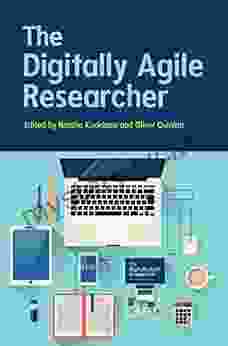
 John Green
John GreenThe Digitally Agile Researcher in UK Higher Education:...
In the rapidly...
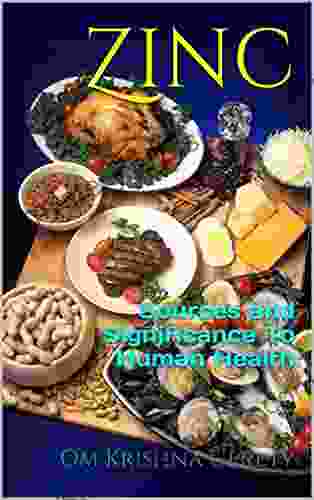
 George Orwell
George OrwellZinc: Sources And Significance To Human Health
Zinc, an essential trace mineral, plays a...

 Mario Simmons
Mario SimmonsToo Scared to Tell: A Harrowing and Thought-Provoking...
In the realm...
4 out of 5
| Language | : | English |
| File size | : | 742 KB |
| Text-to-Speech | : | Enabled |
| Screen Reader | : | Supported |
| Enhanced typesetting | : | Enabled |
| Print length | : | 507 pages |
| Lending | : | Enabled |


